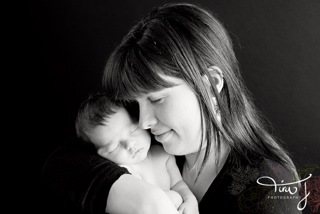Randy Alcorn's Blog, page 216
March 19, 2012
October Baby: a strong film with a prolife message
 Before I get to today's post: our daughter Karina and her husband Dan’s third son, David, was born last month. Here are some terrific photos of him and his brothers. As Karina's dad and one of David, Jack, and Matt's grandpas, I have to say "Wow!" Thanks to the photographer, Tira J, And thanks to Karina, my little girl, for being such a wonderful mom. And Dan for not only providing his 23 chromosomes to match Karina’s, but also for being a great dad to his boys. And King Jesus for his often overlooked roles of “just” being Creator and Redeemer!!!!
Before I get to today's post: our daughter Karina and her husband Dan’s third son, David, was born last month. Here are some terrific photos of him and his brothers. As Karina's dad and one of David, Jack, and Matt's grandpas, I have to say "Wow!" Thanks to the photographer, Tira J, And thanks to Karina, my little girl, for being such a wonderful mom. And Dan for not only providing his 23 chromosomes to match Karina’s, but also for being a great dad to his boys. And King Jesus for his often overlooked roles of “just” being Creator and Redeemer!!!!
“One generation will commend your works to another; they will tell of your mighty acts” (Psalm 145:4).
Now on to October Baby: this new movie will be in theaters March 23, and I encourage you to go see it. Nanci and I were sent a preview copy and really enjoyed it.
October Baby is a strong film with a prolife message. Plus, the producers have assigned 10% of the profits to the Every Life is Beautiful Fund, which will distribute funds to frontline organizations helping women facing crisis pregnancies, life-affirming adoption agencies, and those caring for orphans.
Check out the trailer and synopsis:
"You saw me before I was born." Psalm 139:16 (NLT)
As the curtain rises, Hannah hesitantly steps onto the stage for her theatrical debut in college. Yet before she can utter her first lines, Hannah—unscripted—collapses in front of the stunned audience.
After countless medical tests, all signs point to one underlying factor: Hannah's difficult birth. This revelation is nothing compared to what she then learns from her parents: she was actually adopted … after a failed abortion attempt.
Bewildered, angered, and confused, Hannah turns for support to Jason, her oldest friend. Encouraged by his adventurous spirit, Hannah joins his group of friends on a Spring Break road trip, embarking on a journey to discover her hidden past … and find hope for her unknown future.
In the midst of her incredible journey, Hannah finds that life can be so much more than what you have planned.
Gianna Jessen, speaker and abortion survivor, says, “I laughed so hard, and cried so hard, and healed.”
Megan Basham writes in her World Magazine review:
The first thing that will strike many viewers on seeing October Baby, a Christian-made movie about a young woman who discovers she is the survivor of an abortion attempt, is how polished it is. Christian moviegoers have grown accustomed to overlooking some of the more common faults of films targeted at us: OK, the acting wasn't great, the dialogue was corny, but the message was good, the intent was good, and it may impact lives. All those things are true. Still, it is a little frustrating when we have to overlook shortcomings we suspect could have been remedied with a bit more patience or practice.
…A quick glance at the biographies of writer/directors Jon and Andrew Erwin, however, reveals that the brothers have plenty of miles logged on their professional odometers. Beginning as camera operators for ESPN and Fox NFL, then directing award-winning music videos and commercials, and later producing documentaries, they developed expertise in their craft that goes a long way toward making the worthy idea of October Baby a more-than-worthy viewing experience.

October Baby
 Before I get to today's post: our daughter Karina and her husband Dan’s third son, David, was born last month. Here are some terrific photos of him and his brothers. As Karina's dad and one of David, Jack, and Matt's grandpas, I have to say "Wow!" Thanks to the photographer, Tira J, And thanks to Karina, my little girl, for being such a wonderful mom. And Dan for not only providing his 23 chromosomes to match Karina’s, but also for being a great dad to his boys. And King Jesus for his often overlooked roles of “just” being Creator and Redeemer!!!!
Before I get to today's post: our daughter Karina and her husband Dan’s third son, David, was born last month. Here are some terrific photos of him and his brothers. As Karina's dad and one of David, Jack, and Matt's grandpas, I have to say "Wow!" Thanks to the photographer, Tira J, And thanks to Karina, my little girl, for being such a wonderful mom. And Dan for not only providing his 23 chromosomes to match Karina’s, but also for being a great dad to his boys. And King Jesus for his often overlooked roles of “just” being Creator and Redeemer!!!!
“One generation will commend your works to another; they will tell of your mighty acts” (Psalm 145:4).
Now on to October Baby: this new movie will be in theaters March 23, and I encourage you to go see it. Nanci and I were sent a preview copy and really enjoyed it.
October Baby is a strong film with a prolife message. Plus, the producers have assigned 10% of the profits to the Every Life is Beautiful Fund, which will distribute funds to frontline organizations helping women facing crisis pregnancies, life-affirming adoption agencies, and those caring for orphans.
Check out the trailer and synopsis:
"You saw me before I was born." Psalm 139:16 (NLT)
As the curtain rises, Hannah hesitantly steps onto the stage for her theatrical debut in college. Yet before she can utter her first lines, Hannah—unscripted—collapses in front of the stunned audience.
After countless medical tests, all signs point to one underlying factor: Hannah's difficult birth. This revelation is nothing compared to what she then learns from her parents: she was actually adopted … after a failed abortion attempt.
Bewildered, angered, and confused, Hannah turns for support to Jason, her oldest friend. Encouraged by his adventurous spirit, Hannah joins his group of friends on a Spring Break road trip, embarking on a journey to discover her hidden past … and find hope for her unknown future.
In the midst of her incredible journey, Hannah finds that life can be so much more than what you have planned.
Gianna Jessen, speaker and abortion survivor, says, “I laughed so hard, and cried so hard, and healed.”
Megan Basham writes in her World Magazine review:
The first thing that will strike many viewers on seeing October Baby, a Christian-made movie about a young woman who discovers she is the survivor of an abortion attempt, is how polished it is. Christian moviegoers have grown accustomed to overlooking some of the more common faults of films targeted at us: OK, the acting wasn't great, the dialogue was corny, but the message was good, the intent was good, and it may impact lives. All those things are true. Still, it is a little frustrating when we have to overlook shortcomings we suspect could have been remedied with a bit more patience or practice.
…A quick glance at the biographies of writer/directors Jon and Andrew Erwin, however, reveals that the brothers have plenty of miles logged on their professional odometers. Beginning as camera operators for ESPN and Fox NFL, then directing award-winning music videos and commercials, and later producing documentaries, they developed expertise in their craft that goes a long way toward making the worthy idea of October Baby a more-than-worthy viewing experience.

March 16, 2012
Just Children: Mobilizing Young People as Peacemakers

Today’s post features guest blogger Michael McGill with Breakthrough Partners, a ministry whose work I deeply appreciate. Eternal Perspective Ministries has supported their work for many years. Through an initiative called Just Children, they’re now working to carry out Christ’s call to be peacemakers and to care for vulnerable children through an innovative strategy that equips young people—in places impacted by both poverty and conflict—to be peacemakers in their communities. I love what their ministry is about and look forward to seeing how God will use their efforts to spread the gospel and bring glory to Himself.
Shreya’s Story of Exchanging Cycles of Violence for True Peace
by Michael McGill
Ask a typical American teenager about their experience with war and violence, and you’ll find that it’s usually limited to R-rated movies, explosive video games, and snippets from news programs. But for fourteen-year-old Shreya*, who grew up amidst the horrors of war in northern Sri Lanka, this was her reality.
As part of the Tamil ethnic group, she hated the ruling Sinhalese and their military that killed her father, her little sister, and other villagers when they attacked. But she also grew to hate the Tamil Tigers who took her brother when he was only thirteen and forced him to fight and die on the front lines of their battle for an independent state.
There was little opportunity for education and virtually no healthcare in such a place of instability and violent conflict, and sometimes little food as well. Shreya and her two remaining siblings often went hungry.
When Shreya was twelve, her mother moved the family to a makeshift squatter’s slum just outside the capital city in hope of finding work. It proved to be a fateful choice for her daughter. In these poor communities, sexploiters often prey on the vulnerable who have little hope of seeing justice done. Not long after they moved, Shreya was tricked and sold to be raped by a well-protected man in the city. She was devastated. When she found her way back to her home in the slum, she felt hopeless, ashamed, and angry.
As the weeks passed, Shreya considered taking her own life or escaping from the slum in some other way. She knew that some of her friends had joined the Tamil Tigers to fight and they usually had enough to eat; but she also knew the girls were often sexually abused or died in battle. Other girls and boys turned to prostitution to get by. Shreya saw how violence had lead to so many problems in her life and country; but she knew few other options.
Not long after, a friend providentially brought her to a gathering where she could get food through a project of a local Christian organization. There she discovered that they also had an active children’s program. Shreya was skeptical at first—mostly just watching and listening. She was surprised to see children working together to bring peace and prosperity to their communities and receiving help from adults to do so. She was even more surprised to see once-hopeless children appearing joyful and speaking of “Jesus forgiving, and giving new life and the ability to forgive others.” A glimmer of hope began to rise within her. After months of watching, Shreya decided to risk trusting Christ as she saw other children doing. She soon felt her burdens lifted and found a new ability to forgive others as she had been forgiven, which gave her freedom to serve others.
Shreya joined the Youth Safety Patrol, where small groups of children regularly patrol her community acting to help prevent violence, educate other children, and report crime to trusted adults. Shreya was thrilled to have an opportunity help others avoid the abuse she herself had suffered. She also began working with other children building reconciliation between Tamil and Sinhalese people groups through sports, song and dance activities, and special ceremonies of repentance and forgiveness.
“I feel hope for the future,” Shreya said. Her problems were far from over, and she knew she alone could not save all children in her community from violence and exploitation. But she also knew that she wanted to join with others to bring peace and healing to her country as Christ had begun to do in her own life.
Sadly, Shreya’s experiences of suffering are all too common today, and the opportunities she found to bring peace to her community are all too rare. Nearly 90% of our world’s 2.2 billion children live in developing nations (UNICEF 2011). Nearly 80% of the poorest nations in the world have experienced a major civil war in the recent past, and in some countries, over half of the population is under 18 years old (UNICEF 2004). Countries where youth represent a large percentage of the population have a much higher risk of terrorism, war, and other violence (Urdal 2004; Heinsohn 2005).
Breakthrough Partners’ Just Children initiative believes children and young people in these high-risk countries are not a burden—rather, they are a valuable asset to be nurtured. We have a unique opportunity to show Christ’s love by better helping his little ones be known as peacemakers who shape brighter futures for their nations. The abundance of young people in these high-risk areas provides a chance to equip and mobilize peacebuilders like Shreya, and thereby, help to break cycles of violence and build cycles of peace.
*Shreya’s story is an amalgamation of several children’s stories in order to protect their identities and give an image of the many challenges these children face.
Learn more about Just Children at www.JustChildren.org. If you would like to contribute to their cause, you can send your designated contribution to EPM and 100% will be passed on to the ministry. You can also give online at www.breakthroughpartners.org/giving.htm and select “Just Children” from the drop down menu.

March 14, 2012
Nick Vujicic: "He uses me just the way I am"
In If God Is Good, I share the story of Nick Vujicic, a man born without arms or legs. In this great one and a half minute video from his ministry, Life Without Limbs, you’ll be introduced to Nick and get a glimpse of how God is using him to draw people to Christ.
 When Nick was born, both his mom and his dad, an Australian pastor, felt devastated by their firstborn son’s condition. “If God is a God of love,” they said, “then why would he let something like this happen, and especially to committed Christians?” But they chose to trust God despite their questions.
When Nick was born, both his mom and his dad, an Australian pastor, felt devastated by their firstborn son’s condition. “If God is a God of love,” they said, “then why would he let something like this happen, and especially to committed Christians?” But they chose to trust God despite their questions.
Nick struggled at school where other students bullied and rejected him. “At that stage in my childhood,” he said, “I could understand His love to a point. But... I still got hung up on the fact that if God really loved me, why did He make me like this? I wondered if I’d done something wrong and began to feel certain that this must be true.”
Thoughts of suicide plagued Nick until one day the fifteen-year-old read the story in John 9 about the man born blind: “but that the works of God should be revealed in him” (NKJV). He surrendered his life to Christ. Now, at age twenty-six, he’s earned a bachelor’s degree and encourages others as a motivational speaker. (Nick also recently got married; congratulations to him and his new wife Kanae Miyahara.)
 “Due to the emotional struggles I had experienced with bullying, self-esteem and loneliness,” Nick says, “God began to instill a passion of sharing my story and experiences to help others cope with whatever challenge they might have in their lives. Turning my struggles into something that would glorify God and bless others, I realized my purpose! The Lord was going to use me to encourage and inspire others to live to their fullest potential and not let anything get in the way of accomplishing their hopes and dreams. God’s purpose became clearer to me and now I’m fully convinced and understand that His glory is revealed as He uses me just the way I am. And even more wonderful, He can use me in ways others can’t be used.”
“Due to the emotional struggles I had experienced with bullying, self-esteem and loneliness,” Nick says, “God began to instill a passion of sharing my story and experiences to help others cope with whatever challenge they might have in their lives. Turning my struggles into something that would glorify God and bless others, I realized my purpose! The Lord was going to use me to encourage and inspire others to live to their fullest potential and not let anything get in the way of accomplishing their hopes and dreams. God’s purpose became clearer to me and now I’m fully convinced and understand that His glory is revealed as He uses me just the way I am. And even more wonderful, He can use me in ways others can’t be used.”
When Christ’s disciples asked whose sin lay behind a man born blind, Jesus said, “Neither this man nor his parents sinned” (John 9:3). Jesus then redirected his disciples from thinking about the cause of the man’s disability to considering the purpose for it. He said, “This happened so that the work of God might be displayed in his life.” Eugene Peterson paraphrases Christ’s words this way: “You’re asking the wrong question. You’re looking for someone to blame. There is no such cause-effect here. Look instead for what God can do” (MSG).

March 12, 2012
Maggie Grace: a Reflection of the Goodness of the God Who Made Her
Recently when we were filming in my office, our Golden retriever Maggie, who is growing more each day, made a guest appearance. Thought I would share it with you. Maggie is a gift from God to Nanci and me. We love dogs in general and this one in particular.
 As some of you have experienced, I’ve found something profoundly spiritual in being entrusted with a creation of God (Maggie Grace). I have been so moved toward Christ through each of the dogs I’ve had (including one before I knew Christ, who I believe God used, years in advance, to prepare my heart to love Him). To see my precious Nanci’s joy in Maggie overwhelm—and yet give place to— her grief over our Dalmation Moses has been a worshipful experience. The gratitude runs deep, as does the praise. Nanci and I have laughed and cried together, and marveled at Maggie. Any dog can be a therapy dog, and what God has done in Nanci (and me too) through Maggie this past couple of months borders on the miraculous.
As some of you have experienced, I’ve found something profoundly spiritual in being entrusted with a creation of God (Maggie Grace). I have been so moved toward Christ through each of the dogs I’ve had (including one before I knew Christ, who I believe God used, years in advance, to prepare my heart to love Him). To see my precious Nanci’s joy in Maggie overwhelm—and yet give place to— her grief over our Dalmation Moses has been a worshipful experience. The gratitude runs deep, as does the praise. Nanci and I have laughed and cried together, and marveled at Maggie. Any dog can be a therapy dog, and what God has done in Nanci (and me too) through Maggie this past couple of months borders on the miraculous.
Here’s a slideshow with some more pictures of Maggie:
Romans 1 says, “For since the creation of the world God’s invisible qualities—his eternal power and divine nature—have been clearly seen, being understood from what has been made.” God’s qualities and attributes are made visible in his creation, and the higher the creation, the more manifest they are. Animals are his second highest creation. To observe them is to observe their maker. As I look into Maggie’s eyes, and as she gives and receives love and devotion, I feel drawn to the God who made her.
True, the Fall twists certain things, so obviously we are not to draw conclusions about God’s character from an animal who eats its young! But it is perfectly accurate, I think, to observe a lion’s majesty and see God’s majesty, to see an otter’s playfulness and see God’s playfulness, to see a dog’s unconditional love and see God’s unconditional love. Animals are not just God’s wonderful creations, they are also lenses through which (using discernment) we can and should see his character more clearly. God has given us two books, his written word and his physical creation in which he has also written who He is (we use Scripture to discern which of our observations about the natural world are accurate).
 I have been thinking a lot about the happiness of God. (Remember, He will say to us one day, “Enter into your Master’s happiness”—this is a happiness that pre-existed the creation of the universe.) God is profoundly happy in and of himself, in perfect fellowship of Father, Son and Holy Spirit. Incredibly (see John 17) He has opened his arms to include us in that sacred company. With it comes a capacity for happiness that we have gotten just a hint and foretaste of, I think, in this fallen world. In the time we’ve had her, I’ve seen God’s character not only in his kindness in sharing Maggie with us, but in her beauty, her happiness, her playfulness, her sense of wonder, her love for knowledge and exploration, her joy of discovery, and her utter trust in us and devotion to us.
I have been thinking a lot about the happiness of God. (Remember, He will say to us one day, “Enter into your Master’s happiness”—this is a happiness that pre-existed the creation of the universe.) God is profoundly happy in and of himself, in perfect fellowship of Father, Son and Holy Spirit. Incredibly (see John 17) He has opened his arms to include us in that sacred company. With it comes a capacity for happiness that we have gotten just a hint and foretaste of, I think, in this fallen world. In the time we’ve had her, I’ve seen God’s character not only in his kindness in sharing Maggie with us, but in her beauty, her happiness, her playfulness, her sense of wonder, her love for knowledge and exploration, her joy of discovery, and her utter trust in us and devotion to us.
It’s hard to take my eyes off this creature who tucks herself into remote corners to nap, who always wants in my lap, who chews my slippers and jumps on leaves in the yard when the wind blows. And each time I look at her, I fall more in love with her Creator, and mine. As I rejoice in her I hear God say, “Enter into your master’s happiness.” (I see Maggie entering into Nanci’s and my happiness, and we are her masters.) To know God is happy about her, that He takes delight in her as her Creator, that he longs for the day when his creations, like our Dalmatian Moses, no longer groan and suffer and die (Romans 8), gives me total liberty—full permission from my Lord—to take utter delight in her, knowing she is not an idol, but a precious gift and prompter of praise to Him, the only one worthy of praise.

March 9, 2012
Questions on Heaven from Corban University Students
 Last month I did a Q&A on Heaven at Corban University’s chapel. I enjoyed meeting students and sharing what God’s word says about our eternal home. (I’ll be going back to Corban in May to teach a three-day graduate course titled “Spend 3 Days in Heaven,” which can be taken for credit or audited. If, and only if, it’s what God has for you and you’re able to travel to Oregon, I would love to see you there. Learn more about the class.)
Last month I did a Q&A on Heaven at Corban University’s chapel. I enjoyed meeting students and sharing what God’s word says about our eternal home. (I’ll be going back to Corban in May to teach a three-day graduate course titled “Spend 3 Days in Heaven,” which can be taken for credit or audited. If, and only if, it’s what God has for you and you’re able to travel to Oregon, I would love to see you there. Learn more about the class.)
During the chapel session, students submitted some great questions, but unfortunately we didn’t have time to get to all of them. Campus Pastor Dan Huber shared the remaining questions with me, so I wanted to provide answers for the students and also for anyone who has had similar questions. Special thanks to EPM staff member Julia Stager, who pulled all these answers together!
Here’s the full-length video of the session.
Here are some highlights from the students’ questions. I’ve also included the complete list below.
How can we start a conversation with unbelievers on Heaven, especially those (unbelievers) in our own homes?
See Is the subject of Heaven a good evangelistic topic? and How can I be better prepared for evangelism?
Was Heaven created as a result of The Fall?
See Was Heaven created as a result of the Fall?
Is Heaven a real physical place somewhere in this universe?
Answered at Will Heaven really change locations?
We all really like food. :) Will we eat good food in Heaven?
See Will we eat good food in Heaven? How will it taste like?
What is your response to the book Heaven is for Real? What do you think of the people who claim to have seen Heaven or Hell and then return to this world? What is your view on stories involving an unbelieving person dying, getting a glimpse of Hell, and then returning to life to tell of the story?
See my blog post Heaven is for Real, 90 Minutes in Heaven, and other books about visits to Heaven or Hell

The full list of questions and answers:
Will we instantly know other believers in Heaven even if we had never met them on earth?
Answered at Once in heaven, will people know and recognize those they knew on earth?
On this new planet, is there going to be knowledge of good and evil? Could the new planet turn out with sin just like this one?
Answered at Will we have the opportunity to sin in Heaven?
If we are all rulers in the New Earth, who will be ruled? How does that work/look?
Answered at How does having a servant’s heart affect one’s rewards in Heaven?
Will knowing some of our loved ones are not with us in Heaven make us sad? I have a hard time seeing myself joyful in Heaven knowing that some of my friends and family are in hell and it's too late to do anything. Your thoughts?
Answered at If our loved ones are in Hell, won’t that spoil Heaven?
If we will live on the New Earth, what is the purpose of the New Heaven?
Answered at What does the Bible mean by the term New Heavens?
We all really like food. :) Will we eat good food in Heaven?
See Will we eat good food in Heaven? How will it taste like?
What will we do in Heaven? Will we be with people from our lives, recognize them and even "socialize" with them?
Answered at What will do in Heaven?
What if something tragic has happened but it’s not your fault, but you keep blaming yourself for it? And you can’t stop.
See Guilt, God and Self-Esteem and I carry around unbearable guilt. Is there any hope for me?
How can we start a conversation with unbelievers on Heaven, especially those (unbelievers) in our own homes?
See Is the subject of Heaven a good evangelistic topic? and How can I be better prepared for evangelism?
What does Heaven look like now? Do people have bodies now?
Answered at What will our bodies be like in the present, intermediate Heaven?
My church read your book about Heaven and everyone is excited about Heaven; I’m concerned because now many don’t want to face this world.
See Heavenly Minded and of Earthly Good
What do you think about Rob Bell's idea of Heaven?
See my blog post Rob Bell’s Love Wins
How can we do all things for the glory of God? How would I go about watching football for the glory of God?
See Culture, Creator, and Anticipating a Redeemed Earth
In Mark 12:18-27 it discusses marriage at the resurrection. Will there really be no marriage then or am I misreading?
Answered at Will there be marriage in Heaven?
Will the New Earth have the same land masses as now?
Answered at New Song, New Car, New Earth
Do those in Heaven, like family members and friends, know how we are doing here on earth?
Answered at Do people now in Heaven know what’s happening on earth?
Do you think there will be animals in Heaven? Specifically, will OUR animals be in Heaven?
See Will there be animals in Heaven? and Pets in Heaven?
Will there be sports in Heaven?
Answered in my blog post Faith and Football
Do unborn babies go to Heaven?
See “If an unborn baby is better off in God’s presence…” See also Do infants go to Heaven when they die? and Will we be reunited with children who have died?
What is your response to the book Heaven is for Real? What do you think of the people who claim to have seen Heaven or Hell and then return to this world? What is your view on stories involving an unbelieving person dying, getting a glimpse of Hell, and then returning to life to tell of the story?
See my blog post Heaven is for Real, 90 Minutes in Heaven, and other books about visits to Heaven or Hell
Can you expound upon 2 Cor. 12 and the differences between the 1st, 2nd, 3rd Heaven?
See What is the first, second, and third Heaven?
Is Heaven a real physical place somewhere in this universe?
Answered at Will Heave really change locations?
Will we remember anything from our lives here on earth when we are in Heaven?
Answered at Do people now in Heaven remember what happened on earth?
I have been tempted to do things I shouldn’t be doing, and I want to stop, but things have happened to make me want to keep doing it. How do I stop?
See Is there hope for me and my addiction?
If Heaven is real, what proof of it can we see on earth?
See Is Heaven real? The evidence for Heaven (video)
How will the treasures I've "stored up in Heaven" affect my life there? How much should "heavenly rewards" factor into our anticipation of heaven?
See How much will rewards really matter on the New Earth? and How does a servant’s heart affect one’s rewards in Heaven?
Where does a believer go when he or she dies? Straight to Heaven or is there a waiting period until Christ returns?
See Are we instantly with the Lord when we die?
Will we be able to see those suffering in hell from heaven? Will they be able to see us?
Answered at Is there awareness in Heaven of events on earth?
There's not a whole lot said in the Bible about what it will be like in Heaven. Why do you think that is?
See What does the Bible say about Heaven?
On page 8 in your heaven booklet you say that we will go to a place without suffering but it's not Heaven. Where in the Bible does it say that?
The booklet says that the place we go when we die IS Heaven, but it is the present Heaven, not the future or eternal Heaven. See Present Heaven vs. Eternal Heaven
Was Heaven created as a result of The Fall?
See Was Heaven created as a result of the Fall?
What made you want to be a writer and does your writing help you express your faith and help you grow closer to God?
See Writing as Ministry First, Vocation Second; Why I Write Fiction, and Creativity in Writing; and browse the rest of my blog posts on writing.
The Lord’s Prayer says “your kingdom come your will be done on earth as it is in heaven.” What do you think it means to bring heaven to earth? Examples?
See The Ultimate Answer to the Lord’s Prayer “They will be done in earth, as it is in Heaven”
Do we, as believers, have the ability to bring 'Heaven' to earth? i.e. some ministries entire theology being based around this (signs and wonders).
I’ve not yet addressed this topic, but will in my next book to some degree. For a fairly balanced approach to this subject, see “Signs and Wonders,” a sermon by Henry Dixon.
Do you think the dispensationalist perspective affects your view of Heaven?
Generally, one of the most contentious issues regarding the dispensationalist perspective is in relation to the millennial kingdom. For more on this, see Further Thoughts on the Millennium
March 7, 2012
Whom Would You Choose?
 If you had the opportunity to spend the evening with any person who’s ever lived, whom would you choose? Probably someone fascinating, knowledgeable, and accomplished. High on my list would be C. S. Lewis, A. W. Tozer, Jonathan Edwards, Hudson Taylor, and Charles Spurgeon. Or how about Ruth, David, Mary, Paul, or Adam and Eve? I’d enjoy meeting Eric Liddell, the great runner and Christ-follower portrayed in Chariots of Fire.
If you had the opportunity to spend the evening with any person who’s ever lived, whom would you choose? Probably someone fascinating, knowledgeable, and accomplished. High on my list would be C. S. Lewis, A. W. Tozer, Jonathan Edwards, Hudson Taylor, and Charles Spurgeon. Or how about Ruth, David, Mary, Paul, or Adam and Eve? I’d enjoy meeting Eric Liddell, the great runner and Christ-follower portrayed in Chariots of Fire.
Perhaps you’d choose someone beautiful and talented. Maybe you’d hope that at the end of the evening he or she would have enjoyed your company enough to want to spend time with you again.
Is Jesus the first person you would choose? Who is more beautiful, talented, knowledgeable, fascinating, and interesting than he?
The good news is, he chose you. If you’re a Christian, you’ll be with him for eternity and enjoy endless fascinating conversations and experiences. Incredibly, he’ll also enjoy your company and mine. After all, he paid the ultimate price just so he could have us over to his place for eternity.
Most of us would love to spend the evening with a great author, musician, artist, or head of state. God is the master artist who created the universe, the inventor of music, the author and main character of the unfolding drama of redemption. Head of state? He’s king of the entire universe. Yet if someone says, “I want to go to Heaven to be with God forever,” others wonder, Wouldn’t that be boring?
What are we thinking?
The very qualities we admire in others—every one of them—are true of God. He’s the source of everything we find fascinating. Who made Bach, Beethoven, and Mozart? Who gave them their gifts? Who created music itself and the ability to perform it?
All that is admirable and fascinating in human beings comes from their Creator.

March 5, 2012
His Final Interview: C.S. Lewis on the Future and Space Travel
Shortly before he died November 22, 1963 (yes, the same day as John F. Kennedy), C. S. Lewis granted his final interview to Sherwood Elliot Wirt, of Decision Magazine. It’s a fascinating interview. I found the final two questions and answers interesting:
Wirt: What do you think is going to happen in the next few years of history, Mr. Lewis?
Lewis: I have no way of knowing. My primary field is the past. I travel with my back to the engine, and that makes it difficult when you try to steer. The world might stop in ten minutes; meanwhile, we are to go on doing our duty. The great thing is to be found at one’s post as a child of God, living each day as though it were our last, but planning as though our world might last a hundred years.
We have, of course, the assurance of the New Testament regarding events to come. I find it difficult to keep from laughing when I find people worrying about future destruction of some kind or other. Didn’t they know they were going to die anyway? Apparently not. My wife once asked a young woman friend whether she had ever thought of death, and she replied, “By the time I reach that age science will have done something about it!”
Wirt: Do you think there will be widespread travel in space?
Lewis: I look forward with horror to contact with the other inhabited planets, if there are such. We would only transport to them all of our sin and our acquisitiveness, and establish a new colonialism. I can’t bear to think of it. But if we on earth were to get right with God, of course, all would be changed. Once we find ourselves spiritually awakened, we can go to outer space and take the good things with us. That is quite a different matter.
 As a fan of his space trilogy, I especially love Lewis’s final answer in light of the biblical teaching of a new heavens and New Earth, in which righteousness dwells (2 Peter 3:13). In such a new universe, with a new outer space, might people build and travel and explore to the glory of God?
As a fan of his space trilogy, I especially love Lewis’s final answer in light of the biblical teaching of a new heavens and New Earth, in which righteousness dwells (2 Peter 3:13). In such a new universe, with a new outer space, might people build and travel and explore to the glory of God?
The stars of the heavens declare God’s glory (Psalm 19:1), yet how vast and distant they are. God made countless billions of galaxies containing perhaps trillions of nebulae, planets, and moons. Not many in human history have seen more than a few thousand stars, and then only as dots in the sky. If the heavens declare God’s glory now, and if we will spend eternity proclaiming God’s glory, don’t you think exploring the new heavens, and exercising dominion over them, will likely be part of God’s plan?
As a twelve-year-old, I first viewed through a telescope the great galaxy of Andromeda, consisting of hundreds of billions of stars and untold numbers of planets, nearly three million light years from Earth. I was mesmerized. I also wept, not knowing why. I was overwhelmed by greatness on a cosmic scale and felt terribly small and alone. Years later I first heard the gospel. After I became a Christian, I found that gazing through the telescope became an act of delighted worship.
 From the night I first saw Andromeda’s galaxy, I’ve wanted to go there. I now think it’s likely I will.
From the night I first saw Andromeda’s galaxy, I’ve wanted to go there. I now think it’s likely I will.
It’s hard for me to believe God made countless cosmic wonders intending that no human eye would ever behold them and that no human should ever set foot on them. The biblical accounts link mankind so closely with the physical universe and link God’s celestial heavens so closely with the manifestation of his glory that I believe he intends us to explore the new universe. The universe will be our backyard, a playground and university always beckoning us to come explore the wealth of our Lord—as one song puts it, the God of wonders beyond our galaxy.

March 1, 2012
The Elements in True Reformation
In his excellent (though unlikely titled) book Hot Tub Religion, J. I. Packer asks “What would a work of divine reformation in our churches today look like?” Great question, and I loved the six answers Packer—one of my all- time favorite people—offers.
First, there would be a sense of biblical authority—that is, an awareness that biblical teaching is divine truth and that the invitations and admonitions, threats and warnings, promises and assurances of Scripture still express the mind of God toward mankind. The Bible would be honored again as the Word of God, and the perverse, pluralism of liberal theology, which addles the brains and blinds the hearts of many, would wither and die. The root of this pluralism is that teachers feel free to ignore some of the things the Bible teaches and to pull others out of context. The fruit of it is that God’s people are led astray into dry places and the Holy Spirit of God is completely quenched. Reformation always begins as a call from God to “come out of the wilderness” of subjective speculation and spiritual impotence and learn again in humility the true teaching of the written Word about grace and godliness, knowing that the secret of power for living lies here. Thus, unhappily, reformation always leads to controversy for some resist the message.
Second, there would be a spirit of seriousness about eternal issues. Heaven and hell would be preached about, thought about, and talked about once again. Life in this world would once again be lived in the light of the world to come, and the Philippian jailer’s question, “What must I do to be saved?” would be seen as life’s basic question once more. For most of this century the church, liberal and conservative, in all denominations, has been so occupied with this world that minds turned to eternity have been the exception rather than the rule. Sociopolitical, cultural, sporting, and money-making interests have dominated Christian minds rather than the laying up of treasure in heaven. A work of reformation would change that, not by withdrawing Christians from these fields of action, but by radically altering their perspective on what they are doing so that God’s glory and eternal values would become the chief concerns.
Third, there would be a passion for God, transcending any interest in religion or cultivation of religiosity. One’s relationship to God would be seen as the most important thing in the world, and a Bible-based awareness of the greatness and awesomeness of God, the eternal Savior-Judge, in whose hands we ever are, would displace all cheap thoughts of God as just a useful pal.
Fourth, there would be a love of holiness growing out of deep conviction of sin, deep repentance, deep gratitude for forgiveness and cleansing through the blood of Jesus Christ, and a deep desire to please God. Casualness about righteousness, cutting moral corners, areas of blatant self-indulgence, love of luxury, and broken commitments have disfigured twentieth-century Christianity at all levels. This would change, as indeed it needs to, for moral standards among Christian people. As in the world around them, seem to be getting worse rather than better. It is frightening to see how little believers nowadays seem to be bothered about personal sin.
Fifth, there would be a concern for the church. Christians would catch the biblical perspective, in which the church is the center and focal point of God’s plan and the display ground of his saving and sanctifying wisdom (see Eph. 3:1-12). They would be deeply concerned about the image that the church presents to the world, and any form of unfaithfulness, carnality, false doctrine, formalism, disorder, or wrongheadedness in the church would cause them distress and send them to their knees. God should be honored, not dishonored, in his church, and the church should show itself strong in standing against the world and testifying to its Savior. These are universal Christian concerns at reformation times, and saints at such times will endure and risk anything in order to see the church move in the right direction.
Sixth, there would be a willingness to change—whether from sin to righteousness, or from lassitude to zeal, or from traditional patterns to new procedures, or from passivity to activity, or any other form of change that was needed. Believers would come together to praise, pray, encourage each other, and see what they could do together to advance the cause of Christ. It would be as if they had awakened after a long sleep. They would wonder how they were able to be somnolent, apathetic, and inactive for so long. What new things they would find themselves doing cannot be specified in advance beyond this general formula, but should God work in reformation, it is safe to say that newness of discipleship and change of ways in some shape or form would be the experience of us all.

February 27, 2012
Evaluating Movies in Light of Scripture
 On my Facebook page, someone asked: "Randy, you often mention that you and Nanci have been to a movie. I'm curious about what kind and rating of movies you attend. I'm interested in how you regard the type of movie (violence, sexual overtones, etc.). Should Christians knowingly attend such films? This of course also applies to TV programs."
On my Facebook page, someone asked: "Randy, you often mention that you and Nanci have been to a movie. I'm curious about what kind and rating of movies you attend. I'm interested in how you regard the type of movie (violence, sexual overtones, etc.). Should Christians knowingly attend such films? This of course also applies to TV programs."
Good movies are hard to find. I know, we’re supposed to pretend that movies have no influence on us, or our children. That way we can be cool and go with the popular drift of culture and prove that not all Christians are uptight and moralistic.
But sexually explicit—and even suggestive—movies, TV, books, etc. are unacceptable according to Ephesians 4-5. Non-gratuitous violence can be acceptable for adults, I think, as long as it neither tempts us to do violence nor desensitizes us to true violence. Figuring that out will vary from person to person. But certainly our general Christian tolerance for sexual immorality is way too excessive. Remembering that Jesus is always with us, and asking ourselves what He thinks, should make a big difference.
Some Christians might say, “But it’s almost impossible to rent a movie without sex and offensive language.” There are Christian movie-review sites that can help you make good selections for family viewing. (Check out www.christiananswers.net/spotlight/movies; www.movieguide.org; or www.pluggedin.com.) There are also services which offer edited movies, television adaptors which edit profanity, and DVD software that cuts offensive scenes from movies.
 Even then, we need to make sure that we are evaluating what we are watching in light of Scripture. Instead of His Word simply being one more influence on us, God intends it to be authoritative over all other influences. I read it not simply as one more source of input but as the Source and the authoritative standard by which I judge all other input.
Even then, we need to make sure that we are evaluating what we are watching in light of Scripture. Instead of His Word simply being one more influence on us, God intends it to be authoritative over all other influences. I read it not simply as one more source of input but as the Source and the authoritative standard by which I judge all other input.
I evaluate Seinfeld or Friends in light of Scripture. Then, if I’m discerning, in my opinion, I stop watching Seinfeld or Friends. Why? Because the themes, while amusingly handled, are often (not always, of course) immoral and tempt me to think in those terms. I evaluate Gladiator in light of Scripture and realize that the themes of courage, the quest for human rights and liberty, and standing up with comrades in making principled sacrifice is biblical. I also discern that the movie’s theology of people without Christ going to Heaven and reuniting with unbelieving family members is false. Using biblical discernment, I glean the true things from the movie, while screening out the bad. Only then is my mind protected from the subtle or not-so-subtle undermining of truth.
Bottom line, suppose there were no decent movies—what then? I enjoy good movies, but the Bible never commands us “Watch movies.” It does command us to “Guard your heart.”







